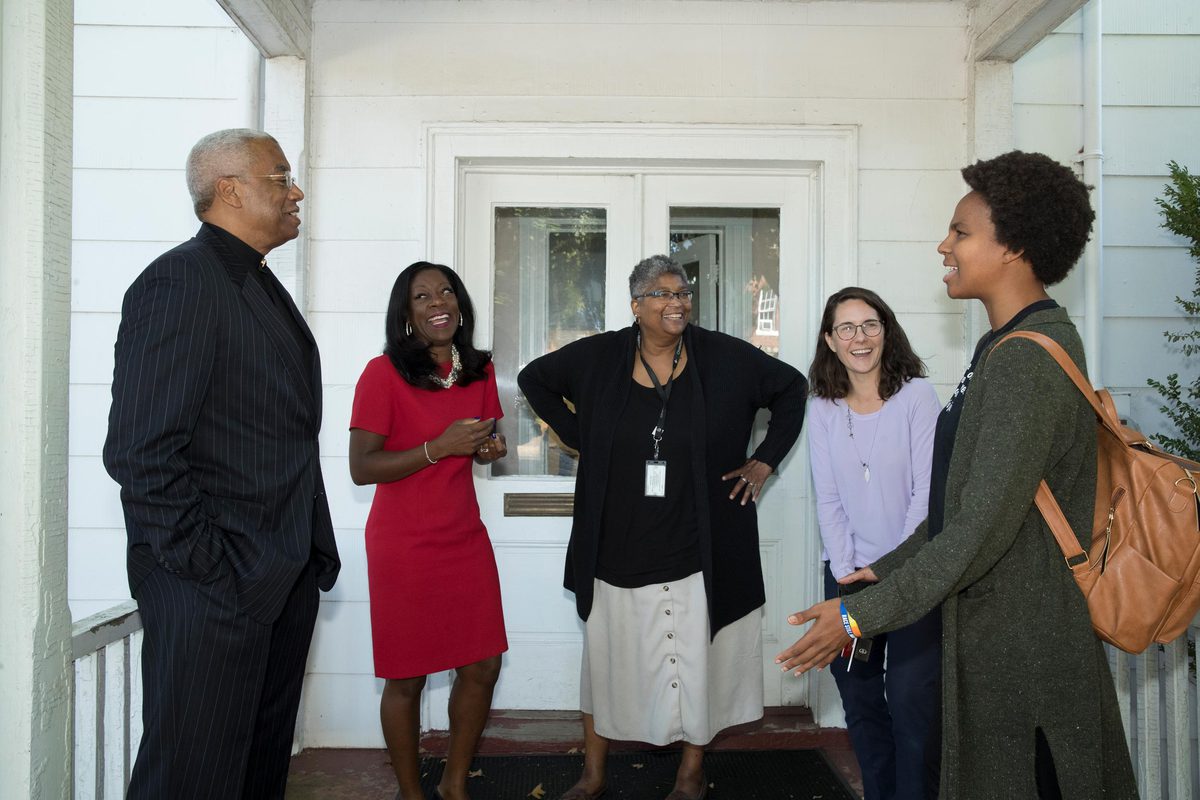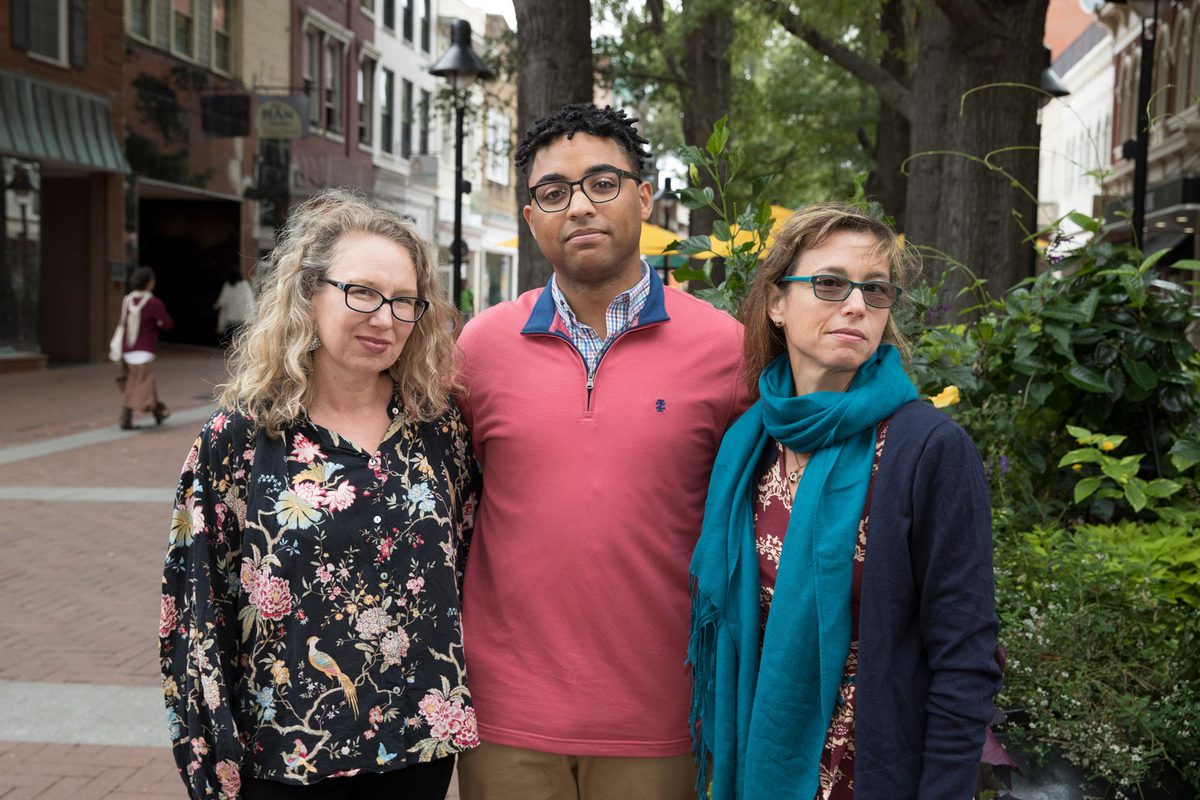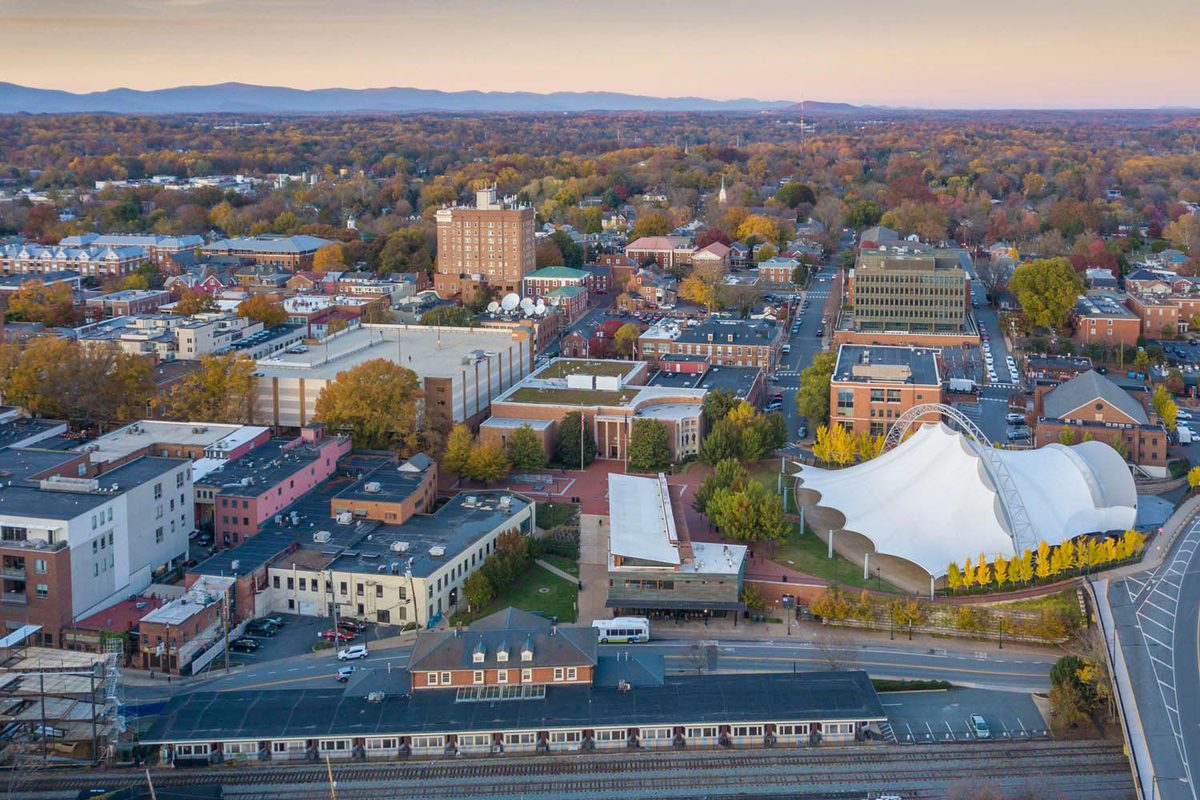Community leaders and University of Virginia faculty and administrators have teamed to launch a groundbreaking initiative that seeks to build better relationships between UVA and the Charlottesville community and tangibly redress racial and socioeconomic inequality.
Organizers say the new Equity Center aims to transform UVA’s presence in local classrooms and community centers where young people gather; in public housing, where some residents make their homes; and in all of the environments where its neighbors live, work and play. They also hope the center’s work will become known nationally as a new and effective way of approaching town-gown partnerships.
At its heart is what the center’s national board member and Chicago community leader Willie “J.R.” Fleming called authentic and true partnership.
“You have a true collective, of community, government, universities and the private sector, working together toward something that has been driving this nation crazy – these questions of inequity and inequality,” Fleming said. “I’m looking forward to seeing this as a model for the country to follow.”
UVA President Jim Ryan echoed Fleming’s enthusiasm.
“To be both great and good, UVA must have a strong relationship with the Charlottesville-area community, grounded in humility and a sense of shared purpose,” Ryan said. “The creation of the Equity Center is an important step in that direction. I am very excited about the work ahead and the opportunities and partnerships it will foster.”
The Equity Center – fully named the UVA Democracy Initiative Center for the Redress of Inequity Through Community Engaged Scholarship – will be led by a local steering committee of Charlottesville-area leaders; a faculty director, UVA School of Law professor Dayna Bowen Matthew; and nationally recognized leaders like Fleming.
After completing a pilot year, the Equity Center recently received funding for three years from the Office of the President, UVA’s Democracy Initiative and a number of schools including Law, Architecture, Nursing, the Frank Batten School of Leadership and Public Policy, the Curry School of Education and Human Development and the College of Arts & Sciences.

Rev. Lehman Bates, African American Pastor’s Council; law professor Dayna Bowen Matthew; Charlene Green, Charlottesville Office of Human Rights; professor Barbara Brown Wilson; Siri Russell, Albemarle County Office of Equity and Inclusion.
Formed at the recommendation of the UVA-Community Working Group that Ryan established last year, the Equity Center will support new and ongoing community-engaged research projects, as well as an emerging community-led research review board to work with UVA’s internal review board regarding research that tangibly benefits the community.
Even during its initial planning year, Equity Center faculty worked with local leaders to support students in the Arts Mentors, Girls Are AllWrite and Project Pipeline programs bringing local youth to UVA for internship, writing and creative design experiences.
In another example, UVA faculty and students partnered with rural community leaders to test and compare the quality of drinking water in homes served by private and public water sources. The researchers worked with local high school and community college students, as well as Virginia Tech scientists, to identify homes with water containing harmful contaminants in order to design and implement solutions to improve public health outcomes and equity.
Going forward, the Equity Center aims to serve as a catalyst to strengthen and expand youth mentorship and pipeline programs designed to help Charlottesville youth find success in higher education and in the job market. UVA faculty will work alongside existing programs to invest University resources to help close the region’s achievement gap.
Importantly, the Equity Center will not displace or duplicate existing educational programs. Rather, it will apply UVA’s research and pedagogical expertise to join and enhance effective work already being done, seeking ways to provide evaluation and grant-writing services to community programs and to grow successful interventions to reach more residents. The center will collaborate with strong existing institutions such as the Jefferson School African American Heritage Center, the African American Pastors’ Council, and the BCBA Banks Collage basketball and dance programs.
“It’s great to have support looking at pipeline programs for youth and how we can get wrap-around support for our kids, from prenatal care all the way through career,” said Daniel Fairley, the youth opportunity coordinator for the city of Charlottesville and a member of the Equity Center’s local steering committee.
“The community and the University are both working toward a systemic, holistic model of youth development and community care that I don’t think has been seen before,” he said. “I want to create a community of care around our kids. That is my focus, and it’s great to see the synergy and the momentum coming from the University and community partnering.”

School of Education professor Nancy Deutsch, left, and music professor Bonnie Gordon, right, are faculty directors at the Equity Center; Daniel Fairley, center, is a member of the local steering committee.
Another local steering committee member, Charlene Green, manager of the Office of Human Rights for the City of Charlottesville and a member of the UVA-Community Working Group, noted the many ways UVA touches community members’ lives.
“UVA plays a huge part in how people here feel about their part in the community. If they are not an employee, they might have had to take advantage of the hospital, or taken classes here, or had family members attend,” said Green, who earned a graduate degree from UVA. “There has to be a partnership.”
“There is a huge amount of work that needs to be done,” said Don Gathers, a community leader who co-chaired the Charlottesville Blue Ribbon Commission on Race, Memorials and Public Spaces, serves on the Charlottesville Civilian Police Review Board and co-founded Charlottesville’s Black Lives Matter chapter. Gathers, also a member of the Equity Center’s local steering committee, noted that he has another tie to UVA – his son, Dre Bryant, is a third-year student and a member of the football team.
“Truth be told, UVA has not always been a good partner,” Gathers said. “But there is so much that can be done, and I look at this as an opportunity to get some of those things addressed.”
Through the Equity Center’s work, community and University leaders have identified five key initiatives to focus on during the next three years. Each will operate with a model of shared governance, with a community leader and a faculty member partnering to direct the initiative.
“Our five initiatives are designed to direct the resources of our research-rich institution to reducing inequalities in areas our community has identified as crucial concerns, including jobs, education, housing and health,” Matthew said.
The five initiatives include:
Redressing 400 Years of Inequality: The Equity Center will provide a series of launch programs titled “Redressing 400 Years of Inequality.” Upcoming launch events include a UVA Faculty Breakfast on Oct. 31, college financial aid and college application workshops throughout the area for local students on Nov. 14, and a gala community dinner honoring the Equity Center’s community partners on Nov. 15.
“Talking about the history of inequity is the easier part. The question is, what do you do?” said music professor Bonnie Gordon, one of the center’s faculty directors. “We are a university, and one way we can start is by helping with the college application process, trying to get students to a place of postsecondary education that is right for them.”
These launch events will culminate with a spring 2020 summit at UVA, when the center will host chief diversity officers from public universities and historically black colleges and universities across Virginia to pledge to redress inequities in their local communities. The spring summit in Charlottesville will establish a recurring “Redressing Inequality” event to convene public colleges and universities throughout the state.
“The Equity Center hopes to build a network of institutions of higher education committed to take action in improving equitable housing, education and other resources,” Matthew said.
Democratization of Data: The Equity Center will co-create and share an “Equity Atlas” open-source platform, making data and information from research projects accessible to advocates, policymakers and community members seeking to reduce inequity. The Equity Center has already partnered with the community to collect and share data important to local decision-makers and, its organizers said, is determined to reverse the practice of university researchers entering minority and low-wealth communities, gathering data and leaving without collaborating or sharing results and benefits.
“People with lived expertise need to be at the table, asking these questions,” said School of Architecture professor Barbara Brown Wilson, a faculty director at the center who has worked closely with the Friendship Court resident-led redevelopment team. “Where the data is placed matters; who owns the data matters; and the research, and how practice is informed, will look really different when you include all these voices.”
The center is partnering with Albemarle County’s Office of Equity and Inclusion and others to develop the platform.
“Albemarle County local government has been excited to partner with UVA’s Equity Center as we expand on our own institution’s equity initiatives,” Equity and Inclusion Director Siri Russell said. “This partnership has been instrumental in supporting our efforts to engage community-wide. We are excited about what comes next.”
Community Research Review Board: The Equity Center will support the continued development of the Community Research Review Board, established by the Public Housing Association of Residents to monitor research projects and ensure that research is valuable and helpful to residents, not exploitive. Matthew said this board will also help avoid now-familiar scenarios in which multiple UVA students and faculty members conduct unrelated research in public housing areas without coordination, overwhelming residents and straining resources.
“We want to change the paradigm of how the University conducts community-based research,” said Karen Waters-Wicks, a Public Housing Association of Residents board member on both the Equity Center’s local steering committee and national advisory board. Wicks, a UVA alumna who also administers the community education department for Albemarle County Schools and serves as an adjunct faculty member at Piedmont Virginia Community College, is looking forward to what’s to come.
“I have been working for many years to build partnerships with the University and the community. I see this as a seed and I am hoping it will bear some good fruit,” she said. “I applaud the University for the first time seeking to institutionalize this effort. I have worked over the years with many faculty members doing community work, but to see it happen institution-wide is a great shift. ... I am excited to be a part of that and hope it will be something lasting and sustainable.”
Youth Educational Pipeline: Through programs like those Fairley leads at Charlottesville High School and elsewhere, the Equity Center will grow educational pipelines for Black, Latinx, low-wealth and immigrant residents across the region to equalize access to higher education and help narrow disparate outcomes.
Support will include technical assistance, grant writing and program evaluation; research, data collection and analysis; communication support and the development of new programming where needed.
In some cases, UVA students will partner with organizations for research support. For example, students from the Curry School of Education and Human Development’s Youth and Social Innovation major are partnering with projects supported by the Equity Center. Some are researching other youth pipeline programs around the country; others are conducting background research for post-incarceration programs.
As part of the effort to increase local leadership capacity, this spring the Equity Center will launch a new fellowship for local community leaders, called the Community Fellows-in-Residence. Community Fellows will share their expertise with University students and faculty, while also benefiting from UVA resources that could help to expand their work. They will receive a $5,000 stipend, and spend a year in residence on Grounds, taking a class, working with a mentor, and using the library and other UVA resources to further their equity efforts in the community.
“We can mutually learn from their work and they can use University resources, both financial and academic, to take their projects to the next level,” Matthew said. “These community leaders will lecture in community engagement classes, hold office hours for students interested in community work, and share their knowledge of the complex challenges and strengths that have emerged after years of racial and socioeconomic inequality.”
Grounded Theory of Structural Racism and Poverty: In addition to the projects listed above, the Equity Center will conduct and share research on how structural racism and poverty drive inequity in health, education, safety, employment and more. Research projects underway include partnership with Piedmont Virginia Community College to improve job training, collaboration with local clergy to examine views on race and experiences in the faith community, and a joint project to analyze the health effects of the racial violence that occurred in August 2017.
Faculty members will incorporate that scholarship in their UVA classes, including the development of a University-wide course to teach the theory, qualitative and quantitative methods of community-engaged scholarship.
“UVA and Charlottesville are not unique in terms of communities with large anchor institutions,” said Nancy Deutsch, a Curry School professor and a faculty director with the Equity Center who works on the youth mentorship programs. “We want to learn from people who are doing really strong community-engaged work across the country and also think about how we can leverage what we are doing to serve as a model for other institutions.”
The center’s community and faculty leaders hope that by serving locally, they will achieve far-reaching impact.
“Our intention is to have both local and national impact,” Matthew said. “By better serving our community, we can model how other research institutions, which often sit amidst similar inequality, can serve their local communities.
“The Equity Center envisions universities around the commonwealth, the nation and the world that serve communities by bringing rich research resources to bear on the work of redressing poverty and racial inequality, and equipping students to lead in building a just society.”
Media Contact
Article Information
October 10, 2019
/content/new-equity-center-aims-create-thriving-university-community-partnerships

